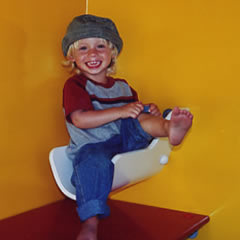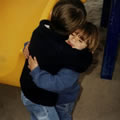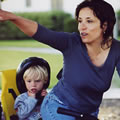|
 What is Emotional Intelligence? What is Emotional Intelligence?
Recent studies have shown that the number one predictor of success
in life is high Emotional Intelligence. Emotional Intelligence is
the ability to be aware of feelings and emotions in one’s
self and others, and to use this information to guide thinking and
actions.
Getting along with others, developing coping skills,
appropriately communicating positive and negative feelings, as well
as cultivating empathy, are several components of Emotional Intelligence
more crucial to success than standard I.Q.
The focus of Dr. Varady’s work is
on helping people raise their own Emotional Intelligence, and on
teaching parents to become their child’s Emotional Coach so
they can help raise the “E.Q.” of that child.
Do Time Outs Work?
In theory time outs are a good idea. But it’s probably the
most misused of all the discipline strategies. If a time out is
used as a way for both the parent and the child to “cool down”
and soothe difficult feelings, then it makes sense. But if it’s
strictly used as a punishment, making a kid sit alone for as many
minutes as they are old, the time out is purely punitive and doesn’t
teach any coping skills.
If discipline is viewed as everything we do as
parents to teach our children how to become good decision makers,
even in the face of difficult feelings and difficult times, then
sending them “away” when they have big feelings they
haven’t mastered appropriate ways of expressing, seems like
a failure on our part. I try to help parents to move beyond being
punishers and instead become their child’s “Emotional
Coach”. Emotional coaches teach coping skills, they don’t
just extinguish “misbehavior”.
If you are going to use time outs I recommend
that you stay with a young child between the ages of 3 and 4 ½.
Before the age of 2 ½, most little ones can’t understand
what a time out is.
 I get really anxious when my child cries.
What can I do?
I get really anxious when my child cries.
What can I do?
Many people get anxious when their children cry, for a multitude
of reasons. Some have to do with how feelings were handled or avoided
in their own childhood. Another reason why it’s so difficult
for us to accept our children’s tears is that most of us are
operating under the erroneous belief that crying is bad. Crying
is actually good for our health, both physical and emotional. When
we cry the stress hormone ACTH is released in our tears. This helps
explain why people actually feel better after a good cry. In experiments
that measure the beneficial outcomes of psychotherapy, those patients
who have cried the most (no matter what type of therapy) achieve
the greatest therapeutic benefits.
Now this doesn’t mean that any infant,
baby, or child should be left to cry alone. It is important that
all children have at least one person who they can cry in front
of. In this way the child feels safe and loved. So it’s important
to pay attention to what you’re feeling when your child begins
to cry so you can soothe your own feelings, and then be able to
be present as an emotional container for your child.
Breathing slowly and deeply, and remembering
the therapeutic benefits of crying, will go a long way in helping
you to be there and accept your child’s tears.
What’s the best way to handle tantrums?
Sometimes a child may be teetering on a temper tantrum and the best
thing to do is let him have one. It may seem counter intuitive,
after all our kid is upset, and we tell ourselves we’re supposed
to help him feel better. But rushing in to help a child prematurely
may be giving him the dangerous message that we as parents can take
away his pain or that it is not O.K. to be feeling big feelings
at all. Also, we do not want to rob children of this important opportunity
(tantrums) to learn about their big feelings. Children need to learn
that it is O.K. to feel and that feelings usually don’t last
very long if we respect them. In this way, they get a good release
without being frightened by their feelings or worried that their
anger or sadness will push us away.
It’s not a good idea to stop their crying
before they fully express their feelings. Tantrums have a natural
ebb and flow, and they come to an end! And when children have a
big release they often come out of it feeling more tranquil and
centered.
It is important to remember that we can be compassionate
to the child - their wants and their needs, without giving in and
letting them have their way. For example when your child has trouble
turning off the TV after you’ve asked him several times, you
can say, “I know you really, really, want to watch more TV.
It must be so hard when you want it so much, but the rule is only
half an hour. Let me help you find something fun to do.”
If the tantrums become aggressive such as hitting
and biting people, parents can redirect their child from this aggressive
behavior to more acceptable expressions of their feelings such as
punching a pillow, or stomping their feet. For older kids we can
direct the aggression to creative outlets such as drawing a picture
or writing a letter about their feelings.
How can I get my child to stop whining?
If children’s psychological needs for attention, power, impact,
and belonging aren’t met, or their physiological needs for
sleep or food aren’t met, they’re more likely to whine
and complain. Whining usually begins around age two. This is a time
when toddlers are beginning to understand feelings and desires,
but because language develops more slowly and they don’t have
enough language to express themselves well, they resort to whining.
Giving positive or negative attention will reinforce
whining. Here’s what you can do instead: When the child begins
to whine you can ask her, “Are you whining?” This will
help her to pause and think about how she sounds. Then you can encourage
her to use her “regular voice”. And let her know how
much you like the sound of her regular voice.
You can also use humor to help diffuse the situation
such as when your 3-½ year old is whining saying, “Does
anyone hear a squeaky mouse?” You can play a game looking
for the mouse and when the child stops whining, “I guess the
mouse is gone!”
Sometimes I feel like a cop, telling
my kids what to do and what not to do all day. How can I feel more
like a parent and less like a police officer?
It’s important to move beyond looking at discipline
as being the most important thing we do as parents. That’s
a very limited view. Parenting is everything we do to have a good
connection and relationship with our children. In your style of
attaching to your child, in play with your child, and in the ways
you discipline your child, if you could focus on accurately attuning
to your child’s feelings ( even when holding firm to a limit),
your connection will deepen and the relationship will blossom.
When a child knows or feels that their parent
is tuning in to them in a warm way, they feel understood- they feel
felt, and it gives them the experience of existing beyond their
own body, into someone else’s mind and heart.
Accurately attuning to our children can be viewed
as our number one discipline tool, because when a child feels understood
by another he is more likely to accept that person’s direction
and guidance!
When my kids don’t listen I find
myself getting enraged, how can I remain calm?
I think we get ourselves feeling more anxious and angry when we
make meaning about ourselves, based on our child’s behavior.
In many situations you’re able to realize that your 2 ½
year old is wired to be autonomous and persistent in pursuing things
that look fun and interesting to him, even though it may be contrary
to what you want him to do. So you may get a bit annoyed because
he’s not following your agenda- but you don’t end up
feeling enraged. But at the times when we do become enraged it is
usually a signal that what is happening to us now has to do with
something in our pasts, often from our childhood. When our child
doesn’t listen, we may tell ourselves that we are powerless
and unable to have impact. Then we feel enraged. So, when you get
enraged you can tell yourself that it probably has something to
do with your own early childhood experiences and then you take a
moment, breathe, talk to yourself in a different way,- this is the
beginning of self-soothing. Only then are you able to be calm, present,
and flexible enough to respond effectively with your child.
|

 What is Emotional Intelligence?
What is Emotional Intelligence? I get really anxious when my child cries.
What can I do?
I get really anxious when my child cries.
What can I do?


